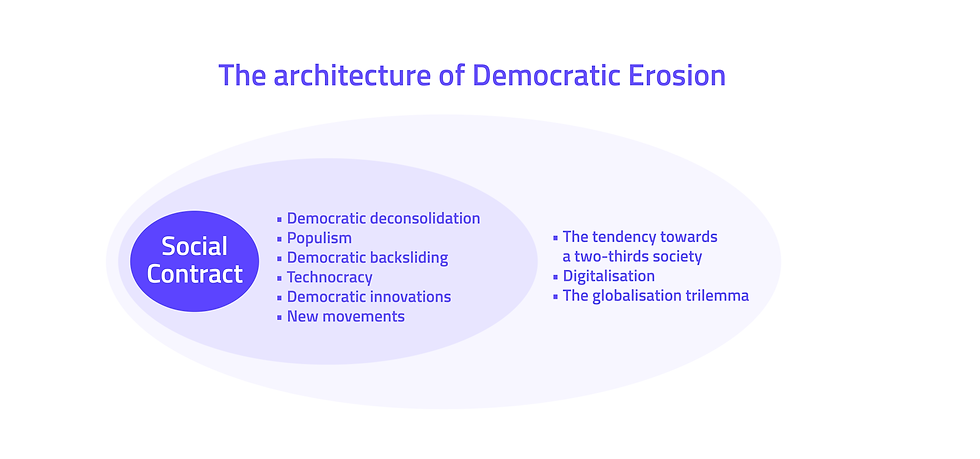New Initiatives Promoting Democracy May Not Succeed Without Inclusive Social Contracts
- Apr 28, 2025
- 5 min read
Updated: Sep 16, 2025
A conversation with Lucie Reed and Nathanaël Colin-Jaeger.
France, Europe, and, by extension, the world has faced increasing polarization, discontent, and grievances in recent years. In response, France and other countries in Europe has launched a series of citizen panels to find solutions to today’s pressing challenges.
The European Union has introduced the European Democracy Shield (EDS) - an initiative designed to protect and strengthen democracy through four key themes:
1. Countering foreign information manipulation and interference
2. Enhancing electoral integrity
3. Building democratic resilience
4. Fostering citizen participation
These initiatives, both by the EU and individual European countries have commendable aims.They have already introduced, and will likely continue to introduce, valuable tools to strengthen democratic practices and culture. However, research suggests that for these initiatives to succeed, they must be grounded in inclusive and democratic social contracts.
A social contract is a philosophical concept developed by thinkers such as Rousseau, Hobbes, Locke, and Rawls. It refers to an implicit or explicit agreement among individuals to form a society.
To explore this idea further, we sat down with Nathanaël Colin-Jaeger, a member of the CO3 Consortium and a Postdoctoral Researcher in Political Philosophy at the Center for Critical Democracy Studies, American University of Paris. We asked him three key questions about the link between social contracts and democracy, with a particular focus on citizen participation—a central theme in both the European Democracy Shield and France’s recent citizen panel experiments.

Nathanael, how would you describe the link between social contracts and citizen participation?
Traditionally, social contracts are viewed as hypothetical, one-time agreements that establish the legitimacy of political and social rules. However, they can also be understood as living, empirical realities—dynamic agreements that underpin a society’s institutions. As societies evolve and face new local or global challenges, these rules must adapt, and citizen participation offers a vital mechanism for driving such change.
In recent years, many European societies have faced critiques of their traditional institutions, particularly representative systems. The Yellow Vest movement in France, for example, demanded citizen-initiated referenda to address this discontent.
When designed thoughtfully, citizen participation can be more inclusive than conventional decision-making processes. It empowers ordinary people—especially marginalized communities and youth, often sidelined by traditional social contracts—to voice their concerns about policies or foundational principles, creating a broader, more representative platform.
Opening social contracts to contestation, particularly from underrepresented voices, is essential for their relevance. One promising approach is through deliberative forums like citizens’ assemblies.
In collaboration with Lucie Reed from the American University of Paris, I interviewed representatives from France’s CESE (Economic, Social, and Environmental Council) for the CO3 project. We explored deliberative experiments such as France’s Citizens’ Conventions—on Climate in 2019 and Assisted Suicide in 2022.
These initiatives offer compelling epistemic benefits, channeling diverse information to improve decision quality, and political advantages, enhancing participation and legitimacy. Ideally, such experiments could become routine, not just for specific policies but also for constitutional reforms and core societal rules, ensuring that social contracts remain responsive to citizens’ evolving needs and perspectives.
What effect can some forms of citizen participation, like deliberative panels and co-creation, have on social contracts?
It’s worth keeping in mind that results in this area should be taken with a grain of salt. Deliberative experiments—like citizen panels or discussions—can turn out differently depending on how they’re set up, what questions are asked, and where they happen. A lot of studies point out that for these experiments to work well, they need solid methods, enough people to reflect the wider public, and ways to get quieter groups involved.
So, my answer is a bit of a guess, based on some broad ideas about these experiments.
First, in theory, there’s a natural link between social contracts and citizen participation. Social contract ideas say that rules are fair when people agree to them. Democracy builds on this by treating everyone as equals. When citizens get involved in making rules or decisions, it shows respect for that equality. That’s why some thinkers, like Hélène Landemore, argue that these deliberative experiments are a better way to live out democratic values than just relying on elected officials.
Second, on the practical side, letting citizens join in shakes up the usual top-down way of running things—where leaders decide, and people just follow. These experiments make leaders more responsive to what citizens say, which can build trust and accountability. It also helps social contracts stay flexible and adapt to new challenges. Citizen conventions aren’t the only option—things like referendums or community groups can do this too.
Third, getting people involved can dial down division. When citizens talk things out and solve problems together, they get a better sense of where others are coming from. This can ease tensions and make people feel less disconnected. Plus, when they see their input matters, it closes the gap between them and the folks in charge.
In short, things like citizen panels or deliberative assemblies can spark fresh ideas for policymaking. They make the “rules of the game” more legitimate and stable while opening the door to new voices and changes in the social contract.
In some EU countries, declining trust in institutions, elected representatives, and fellow citizens threaten the social contract. What mechanisms would you recommend for societies that aim to strengthen democratic social contracts, build trust, and enhance democratic participation?
First, to rebuild trust, these innovations must be meaningfully integrated into political systems. One of the crucial results of our work, with Lucie Reed, warns that without clear pathways to influence policy, such experiments risk deepening disillusionment. It is, therefore, fundamental to underline that “more citizen participation” is not a proper general answer.
For instance, France’s Citizens’ Conventions, organized by the Conseil Économique, Social et Environnemental (CESE), showed potential but faced challenges when recommendations were ignored by traditional representatives. A policy recommendation is to legally mandate that deliberative outcomes feed into parliamentary processes, ensuring citizens see tangible results—like Denmark’s institutionalized consensus conferences, which have a greater impact due to their established role.

Second, enhancing participation requires inclusive design. There are justified concerns about representativeness and power dynamics in deliberative settings. To address this, societies should ensure diverse participation—reflecting age, income, and geography—and provide facilitation to balance voices, preventing domination by more vocal individuals. Participatory budgets, like those in Paris or Porto Alegre, offer a complementary model, letting citizens directly decide on local spending, fostering engagement and accountability.
Finally, tackling underlying issues like economic inequality and polarization is crucial for long-term trust. Deliberative forums alone won’t suffice unless paired with policies addressing structural discontent—such as reducing regional disparities that fuel populism, as seen with France’s Yellow Vest movement. A practical step could be EU-wide funding for local deliberative projects tied to economic equity initiatives.
In summary, societies should adopt and institutionalize deliberative mechanisms, ensure inclusivity and link them to broader reforms. By empowering citizens and showing responsiveness, these steps can renew the social contract and strengthen democracy across the EU.


